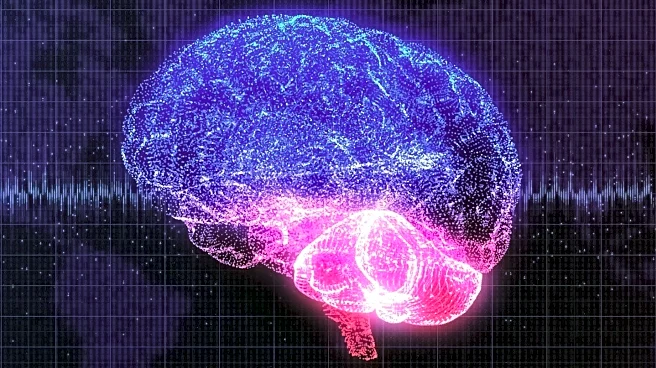What's Happening?
Researchers from the Universities of Bath and Bristol have developed a new diagnostic tool called the Fastball test, which aims to identify early signs of dementia. The test involves participants wearing an EEG headset while viewing a series of images on a screen, assessing the brain's ability to differentiate between images based on prior exposure. A recent study published in Brain Communications indicates that the Fastball test can reliably detect memory issues in individuals with mild cognitive impairment (MCI), a precursor to Alzheimer's disease. The study involved 33 participants with memory deficits, 20 with other cognitive impairments, and 54 without cognitive issues. Results showed that those with amnestic MCI had significantly reduced responses compared to healthy adults and those with non-amnestic MCI. This test could facilitate earlier intervention with emerging disease-modifying drugs targeting amyloid plaques, such as Eisai/Biogen's Leqembi and Eli Lilly's Kisunla.
Why It's Important?
The development of the Fastball test is significant as it addresses the challenge of diagnosing Alzheimer's disease in its early stages, potentially years before current diagnostic tools can detect it. Early diagnosis is crucial for timely intervention, which can improve patient outcomes and slow disease progression. The test's ability to be administered outside clinical settings, such as in homes, could lead to wider screening and monitoring, making it accessible to more people. This advancement could also support the stratification of patients for treatment, optimizing the use of new therapies. The potential for scaling the test for use in GP surgeries and memory clinics further underscores its importance in public health.
What's Next?
Further research is needed to validate the Fastball test's effectiveness in predicting clinical trajectories and supporting patient stratification for treatment. A prospective study is required to assess its ability to classify individual patients and estimate error rates. If successful, the test could become a routine tool in healthcare settings, enhancing early detection and intervention strategies for Alzheimer's disease. Additionally, the FDA's recent approval of a blood test for Alzheimer's diagnosis may complement the Fastball test, increasing the use of anti-amyloid therapies.
Beyond the Headlines
The Fastball test represents a shift towards more accessible and objective diagnostic tools for dementia, potentially transforming how cognitive decline is detected and managed. Its development highlights the growing interest in non-invasive, technology-driven approaches to healthcare, which could lead to more personalized and effective treatments. The integration of such tools into everyday healthcare practices may also prompt ethical discussions about privacy and data security, given the sensitive nature of cognitive health data.










